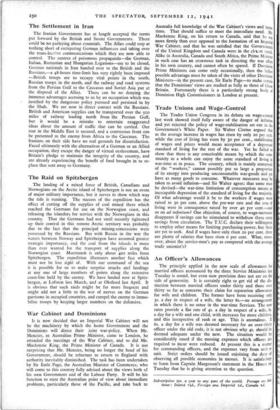Trade Unions and Wage-Control
The Trades Union Congress in its debate on wage-control last week showed itself fully aware of the danger of inflation and yet rejected the policy of wage-stabilisation set out in the Government's White Paper. Sir Walter Citrine argued that as the average increase in wages has risen by only 20 per cent while the cost of living has risen by 30 per cent., stabilisation of wages and prices would mean acceptance of a depressed standard of living for the rest of the war. Yet he failed to show that there is any conceivable means by which the corn. munity as a whole can enjoy the same standard of living in war-time as in peace. The country, which is mainly composed of the "workers," cannot possibly put so large a proportion of its energy into producing unconsumable war-goods and yet have as many goods to consume. Whatever measures may be taken to avoid inflation—and Sir Walter agreez that some must be devised—the war-time limitation of consumption means an inescapable depression of the standard of living for the majority. Of what advantage would it be to the workers if wages were raised to 30 per cent. above the pre-war rate and the cost of living were in consequence raised by over 40 per cent.—and so on ad infinitum? One objection, of course, to wage-increases disappears if savings can be stimulated to withdraw these extra savings from circulation. The T.U.C. declare their willingness to employ other means for limiting purchasing-power, but these are yet to seek. And if wages have only risen zo per cent. there are plenty of salaries that have risen o per cent. What, more- over, about the service-man's pay as compared with the average trade unionist's?


























 Previous page
Previous page